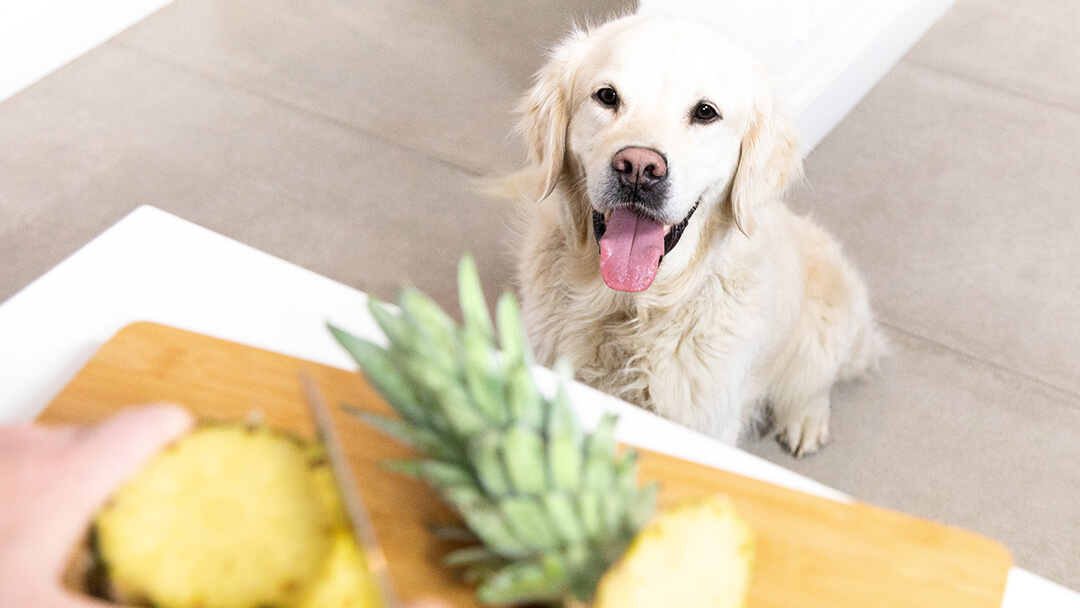Yes, dogs can eat pineapple in moderation. Pineapple is safe and can be a healthy treat for dogs.
It offers vitamins and hydration. Pineapple is not only delicious but also nutritious. Packed with vitamins and minerals, it can benefit your dog’s health. Yet, it’s essential to feed it correctly to avoid any issues. In this blog post, we’ll explore the benefits and potential risks of feeding pineapple to your dog.
We’ll also provide tips on how to serve it safely. By the end, you’ll know whether pineapple can be a part of your dog’s diet. So, let’s dive into the world of this tropical fruit and see if it’s a good choice for your furry friend.
Introduction To Pineapple For Dogs
Ever wondered if your furry friend can enjoy the sweet and tangy flavor of pineapple? Good news! Pineapple can be a delightful treat for your dog, when given in moderation. But before you share this tropical fruit with your pet, it’s essential to understand the benefits and precautions.
Why Pineapple?
Pineapple is not only a tasty snack but also a fun way to diversify your dog’s diet. Many dogs love the juicy and refreshing taste. Offering pineapple as an occasional treat can add excitement to their routine.
It’s crucial to remember that not all fruits are safe for dogs. But pineapple, when properly prepared, can be a healthy addition. Always serve it in small, bite-sized pieces and remove the tough core and spiky skin.
Nutritional Benefits
Pineapple is packed with vitamins and minerals that are beneficial for your dog’s health. It contains vitamin C, which supports the immune system and overall vitality.
Additionally, pineapple is rich in manganese, an essential mineral for bone health and metabolic function. It also provides a good amount of dietary fiber, aiding in digestion and preventing constipation.
Another bonus is the enzyme bromelain found in pineapple. Bromelain helps in protein digestion and has anti-inflammatory properties. This can be particularly useful for dogs with certain digestive or inflammatory conditions.
Have you ever tried giving your dog a small piece of pineapple? How did they react? Many dogs enjoy the natural sweetness, but it’s always best to introduce any new food gradually and observe for any adverse reactions.
Incorporating pineapple into your dog’s diet can be a refreshing change, but always consult your vet to ensure it suits your pet’s dietary needs. Your dog’s health and happiness are paramount!
Health Benefits For Dogs
Dogs can enjoy pineapple as a tasty treat. It is rich in vitamins and minerals that support their health. Moderation is key to avoid digestive issues.
### Health Benefits for Dogs Pineapple isn’t just a tasty treat for humans; it can be a healthy snack for your dog too. It’s packed with nutrients that can benefit your furry friend in various ways. But what exactly are these benefits?Vitamins And Minerals
Pineapples are rich in essential vitamins and minerals. They contain high levels of Vitamin C, which can boost your dog’s immune system and help keep them healthy. Additionally, pineapples are a good source of Vitamin B6, which supports brain function and energy levels. Imagine your dog running around with more zest and vitality!Digestive Health
Pineapples contain bromelain, an enzyme that aids in digestion. This can be especially helpful if your dog has a sensitive stomach. Have you ever noticed your dog struggling with digestion? A small amount of pineapple can help alleviate some of those issues. Moreover, the high fiber content in pineapples can promote regular bowel movements, making bathroom breaks smoother for your pet. — Offering pineapple to your dog can be a rewarding experience for both of you. Have you tried giving your dog pineapple yet?Potential Risks And Concerns
Feeding dogs pineapple can pose risks such as upset stomachs and potential allergic reactions. Monitor for signs of discomfort or digestive issues.
Pineapple is a tasty tropical treat that many people love. But can dogs eat pineapple safely? Before you toss some pineapple chunks to your furry friend, it’s important to understand the potential risks and concerns.Allergic Reactions
Just like humans, dogs can have allergies. Pineapple can trigger allergic reactions in some dogs. Symptoms may include itching, swelling, or difficulty breathing. If your dog shows any signs of an allergic reaction, stop feeding them pineapple immediately. Consult your vet if symptoms persist. Every dog is different. Always start with small amounts and monitor your pet’s reaction.Digestive Issues
Pineapple is high in fiber. While fiber is good for digestion, too much can cause problems. Your dog might experience diarrhea or stomach upset. Watch for signs like loose stools or excessive gas. If you notice these, reduce the amount of pineapple or stop completely. Have you ever eaten too much pineapple and felt a burning sensation? Dogs might experience the same due to the fruit’s acidity. In moderation, pineapple can be a healthy treat. However, always keep an eye out for any adverse effects. Is your dog sensitive to new foods? It’s better to introduce pineapple gradually.
Credit: www.pumpkin.care
Proper Serving Sizes
Understanding the proper serving sizes of pineapple for dogs is crucial. Pineapple can be a healthy treat, but moderation is key. Too much can cause digestive issues. Let’s dive into the recommended portions and frequency of serving pineapple to your furry friend.
Recommended Portions
For small dogs, offer only a few small pieces of pineapple. Medium-sized dogs can handle a few more, but still keep it minimal. Large dogs may enjoy a handful of chunks. Always start with a small amount to see how your dog reacts.
Frequency Of Serving
Offer pineapple to your dog no more than once or twice a week. This helps prevent any digestive upset. Rotate pineapple with other healthy treats for variety. Balance is key in your dog’s diet.
Preparation Tips
When feeding your dog pineapple, preparation is key. Dogs can benefit from the vitamins and minerals in pineapple. But you must ensure the fruit is safe and easy for them to eat. Follow these preparation tips to make sure your dog enjoys pineapple safely.
Fresh Vs. Canned Pineapple
Fresh pineapple is the best option for dogs. It contains natural sugars and nutrients. Make sure to remove the skin and core. These parts can be hard to digest and may cause choking.
Canned pineapple should be avoided. It often contains added sugars or syrups. These can upset your dog’s stomach and lead to weight gain. Always choose fresh over canned for a healthier treat.
Safe Serving Methods
Serve pineapple in small, bite-sized pieces. Large chunks can be a choking hazard. Start with just a few pieces to see how your dog reacts. Some dogs may have allergies or sensitivities.
You can also freeze pineapple pieces for a refreshing treat. This is great for hot days. Avoid serving pineapple with any added spices or toppings. Keep it simple and natural for the best results.

Credit: www.purina.co.uk
Signs Of Overconsumption
Feeding your dog pineapple can be a healthy treat. But, like any food, too much can cause problems. Understanding the signs of overconsumption helps keep your pet safe.
Symptoms To Watch For
Overeating pineapple can cause several symptoms in dogs. Watch for diarrhea, which means your dog’s stomach is upset. Vomiting is another sign. This shows your dog’s digestive system is rejecting the pineapple.
Excessive gas is common too. It can make your dog uncomfortable. Look for bloating. Your dog’s belly may appear larger than usual. This can be painful for them.
Lethargy is also a symptom. Your dog may seem more tired than normal. This could mean their body is working hard to process the fruit.
Steps To Take
If you notice these signs, stop giving your dog pineapple. Offer them water to help flush their system. Monitor them closely to see if symptoms improve.
If symptoms persist, contact your vet. They can provide advice and treatment if needed. It’s important to act quickly to prevent further issues.
Alternatives To Pineapple
If you’re wondering whether dogs can eat pineapple, you might also be curious about alternative fruits that can make a tasty and safe addition to your pet’s diet. While pineapple can be a healthy treat, it’s good to have some variety to keep your dog’s meals interesting and nutritionally balanced. Let’s explore some other fruits that are safe for your furry friend.
Other Safe Fruits
There are several fruits that are not only safe but also beneficial for dogs. Apples are a great option. They are low in fat and high in fiber, which is good for your dog’s digestion. Just be sure to remove the seeds and core.
Blueberries are another excellent choice. They are rich in antioxidants, which can support your dog’s overall health. You can offer them as a snack or mix them into their meals.
Bananas are also safe and loved by many dogs. They are high in potassium and vitamins, making them a nutritious treat. Just be mindful of the quantity, as bananas are high in sugar.
Comparing Nutritional Values
When comparing the nutritional values of these fruits, it’s clear that each offers unique benefits. Pineapple is rich in vitamin C and manganese, but it’s also high in sugar. Moderation is key.
On the other hand, apples provide a good amount of fiber and vitamin A but are lower in sugar compared to pineapple. Blueberries, while also containing sugar, offer an impressive antioxidant profile that supports immune function.
Bananas, with their high potassium content, are great for heart health. However, their higher sugar content suggests they should be given sparingly.
Have you tried giving your dog any of these fruits? What was their reaction? Experimenting with different fruits can help you find what your dog enjoys the most while keeping them healthy. Just remember to introduce any new food gradually and monitor for any adverse reactions.
Consulting Your Veterinarian
When asking yourself, “Can dogs eat pineapple?” it’s best to consult your veterinarian first. This ensures the fruit is safe for your furry friend. Getting professional advice helps avoid potential health issues.
Professional Advice
Veterinarians provide expert opinions. They understand your dog’s specific health needs. They can tell you if pineapple is a good choice. Some dogs have allergies or sensitive stomachs. A vet’s guidance can prevent complications. Always seek their advice before introducing new foods.
Personalized Recommendations
Your dog is unique. What works for one may not work for another. Your vet considers your dog’s age, breed, and health history. They provide tailored advice. This ensures your pet enjoys pineapple safely. Personalized recommendations help maintain your dog’s overall well-being.

Credit: www.carecredit.com
Frequently Asked Questions
Are Pineapples Toxic For Dogs?
Pineapples are safe for dogs in moderation. They offer vitamins and hydration but avoid feeding the core and skin.
What Fruit Can’t A Dog Eat?
Dogs can’t eat grapes or raisins. These fruits can cause kidney failure and be toxic to dogs. Avoid feeding them.
How Much Pineapple To Give A Dog?
Give your dog 2-3 small pineapple chunks as a treat. Ensure the pineapple is fresh and free of the core and skin.
Which Fruits Can Dogs Eat?
Dogs can eat apples, blueberries, bananas, strawberries, and watermelon. Always remove seeds and pits before feeding.
Conclusion
Pineapple can be a tasty treat for dogs. It offers vitamins and hydration. Always serve it in small, fresh pieces. Avoid canned pineapple due to added sugar. Watch for any allergic reactions. Moderation is key to prevent digestive issues. Consult your vet if unsure about new foods.
Enjoy the happy moments with your dog and a piece of pineapple.
